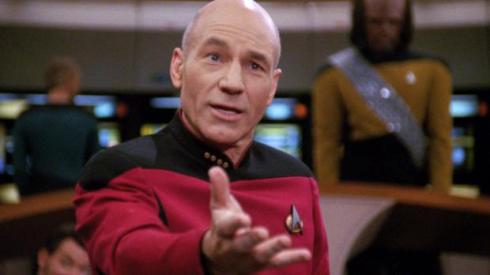You are currently browsing the tag archive for the ‘space travel’ tag.

I have vague memories of watching Star Trek (both the original series and the next generation or TNG) as a kid, mostly dominated by the quirky personas of Spock and Data. Watching Star Trek TNG on Netflix is, in a way, a walk down a memory lane where the memories have sadly not withstood the test of time. It is like re-discovering something that one had not quite discovered properly in the first place. And yet, even if I had watched it back then with the full force of my attention, I would have still missed the profound philosophical undertones of this wonderful series.
The year is 2364. The Enterprise, a Starfleet ship of a United Federation of Planets, is on its mission of deep space exploration, commandeered by Captain Jean-Luc Picard and his team that, notably, includes Data (an android), Deanna Troi (a betazoid who has telepathic abilities), and Worf (a Klingon). In the course of their voyages, one gets glimpses of different species inhabiting distant planets – each with their peculiar customs and beliefs, varying levels of technological advancement, and with names like the Ligonians, the Edo, and the Ferengi. Through the physical and moral challenges that Jean-Luc and his team face, one gets a sense of their ethos. There are references to the troubled history of war and violence as also capitalism out of which humans had evolved, to having stopped enslaving and killing animals for consumption, to the Prime Directive of not interfering with alien civilizations. The technological advances – of warp speed that allows travel faster than the speed of light, of teleportation, AI (as portrayed by the persona of Data), and space travel to distant galaxies – are likely to be the stuff of fantasy for many years to come until we realize it, if we do. The portrayal of this distant future fills the gap in one’s imagination of what the world might look like 300 years from now. What separates the world of Star Trek from us is not merely time or the technological advancement, but also the ideology that looks back at the time we now inhabit for all that it is not. There is no nostalgia for the past, merely a sense of relief at having evolved out of it.
Fictional futures of the kind portrayed in Star Trek provide us with an idealized view of the future – one of space explorers that, much like the seafarers during the Age of Discovery, explore the far reaches of the galaxy but with a reformed ethos – to learn and understand and not interfere. An alternate view of the future may have humanity snuff itself out of existence or atrophy away on a desolate planet. It is the burden of every age to determine where this trajectory is headed, for the path to the future goes through us.
